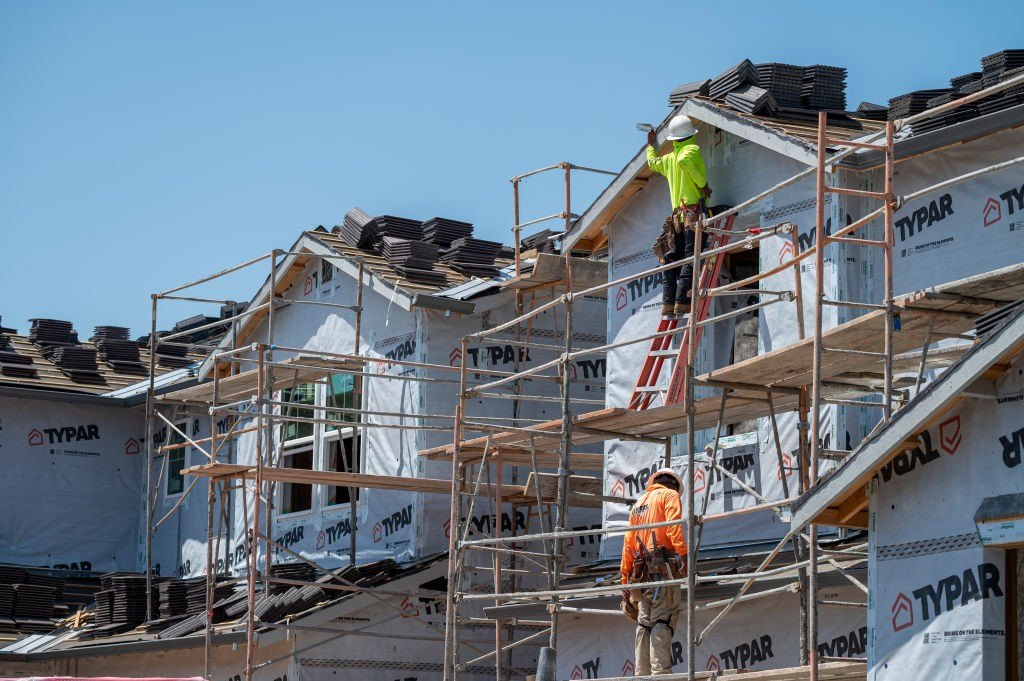The White House has announced a number of new measures intended to spur the construction of more housing units and ease the affordability crisis for renters and homebuyers.
The actions announced on Tuesday include $100 million in new community grants to identify and remove barriers to affordable housing production and preservation, rule changes to provide greater interest rate predictability for state and local housing finance agencies, and proposals to streamline permitting requirements at the state and local levels.
The new measures are the first major housing policy announcement from the administration since President Joe Biden withdrew from the 2024 presidential race against Donald Trump, and Vice President Kamala Harris secured the Democratic nomination. They follow other actions as part of the “Biden-Harris Housing Plan” that the White House says will support the construction of 2 million new housing units.
“President Biden and Vice President Harris have put building more homes at the center of their economic agenda because rents are lower and homes are more affordable when we build more housing,” the White House said in a statement. “The President and Vice President have been laser-focused on lowering housing costs for renters and homeowners alike.”
The announcement comes as housing issues loom large in the 2024 race. Housing affordability currently sits near some of the lowest levels on record, with Freddie Mac estimating the country needs at least 1.5 million additional homes to ease a severe shortage.
“As a housing economist, I am excited to see ongoing housing policy announcements focused on supply during this election cycle,” says Realtor.com senior economist Ralph McLaughlin. “The current announcement by the Biden-Harris administration is focused on supply, something that housing economists like myself have been fixated on for the past few decades. It’s promising to see such policies that target the underlying cause of much of today’s housing troubles: a chronic undersupply of both market-rate and affordable housing stock.”
The newly announced measures include $100 million in new competitive grant funding through the Department of Housing and Urban Development’s Pathways to Removing Obstacles to Housing (PRO Housing) program. Communities across the country are eligible to apply for the funding, which is intended to help remove barriers to local housing production.
“This funding is designed to cut red tape, and make sure that we’re building more homes, especially affordable homes, with urgency because people need help now,” said HUD Acting Secretary Adrianne Todman in a statement.

(David Paul Morris/Bloomberg via Getty Images)
The new grant funding is in addition to $85 million in PRO Housing grants that were awarded last month across 19 states and Washington, DC. Recipients will use those funds to update state and local housing plans, revise land use policies, and streamline the permitting process for housing construction, among other actions.
Tuesday’s announcement also touted a joint HUD-Treasury initiative to provide more interest rate certainty for state and local agencies that use certain federal financing for affordable housing projects. The program implements a floor and a cap, called an interest rate “collar,” on the benchmark Treasury rate used to calculate the all-in rate provided to those agencies.
U.S. Deputy Secretary of the Treasury Wally Adeyemo said the collar initiative will “help reduce the cost to construct more affordable housing that is so urgently needed in neighborhoods across the country.”
The White House also announced a number of proposals to speed certain construction projects, including accelerated historic preservation reviews for federal housing projects and proposals to expedite housing permits at the state and local levels.
McLaughlin says that of the newly announced measures, two in particular stand out: the administration’s focus on expediting housing permit approvals, and the effort to provide interest rate stability for new housing construction projects.
“These efforts will help the market respond to new demand in a more reasonable time frame with more predictability in interest rates for those actually paying for construction,” he says. “In tandem, they will jointly help supply be more responsive to demand, which is something that the housing market desperately needs.”
Harris has yet to put forth detailed policy proposals on housing, or any other issue, since launching her presidential campaign. However, early signs suggest that she plans to deliver a campaign message similar to that of Biden, who had emphasized increased federal funding for affordable housing programs and vowed a crackdown on “corporate landlords.”
At her first major campaign rally at the top of the Democratic ticket, Harris pledged to “take on corporate landlords and cap unfair rent increases.” It suggests she is picking up Biden’s campaign vow to press for federal legislation capping annual rent increases by large landlords at 5% for existing properties.
Trump for his part has said that, if elected, he would lower housing costs by halting unlawful immigration, slashing regulations, and opening up small portions of federal land for new development.







